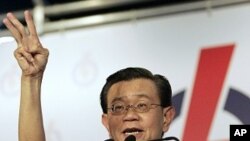Singaporeans are going to the polls Saturday for the most contested election since 1965, when the city-state gained independence from Britain. The People’s Action Party (PAP), which has ruled post-independence Singapore, is expected to win. But analysts say it is facing increasing challenges that have eroded its popularity.
The PAP of Prime Minister Lee Hsien Loong has ruled Singapore since 1965.
Until recently, analysts say, opposition parties have been unwilling or unable to challenge PAP rule.
The party's policies have changed the city-state from a poor, colonial port into a rich, regional hub for business.
And, unlike most Asian countries dominated by a single party, Singapore is a beacon of prosperity and good governance.
But in Saturday's election, opposition candidates are competing for all but five of parliament's 87 seats, making it the most contested poll since independence.
Gillian Koh, a researcher on politics and governance at Singapore’s Institute of Policy Studies, says opposition parties agree with most PAP policies, making competition difficult.
"The People's Action Party has been in government for 52 years because it has delivered on good governance, on economic development," Koh said. "But, its detractors have always said the pace of political development has always paled in comparison."
In past elections opposition parties, aware of their chances, contested only a fraction of available offices and have held, at most, just a few seats in parliament.
But, Koh says they have been able to capitalize on recent discontent with the PAP over rising costs of living, government accountability, and immigration.
Foreign workers make up about one-third of Singapore’s population, leading many Singaporeans to complain about competition for jobs and clogged public transport.
Consequently, the PAP’s share of the popular vote dropped from 75 percent in the 2001 election to 67 percent in 2006.
Koh says despite public grumbling and the unprecedented challenge at the polls, the PAP remains immensely popular for its effective response to public concerns.
"The PAP's fundamental legitimacy stands on its ability to deliver growth and also on being clean," Koh said. "Because, when it first came to power, how it presented itself was that it was really the opposite of what existed in Singapore at that time. And, it’s realized that it has to keep those pillars of legitimacy."
The government has already revised immigration controls and promised to improve transport and social services.
In the lead up to the election, authorities also allowed some opposition criticism in the normally tightly controlled state media and the Internet.
The PAP has been accused of using defamation lawsuits to silence critics and harsh punishments for drug dealers and vandals to maintain order.
Singapore also outlaws political discussion of race and religion.
Prime Minister Lee’s father and Singapore’s architect, Lee Kuan Yew, co-founded the party and argues the controls are necessary to prevent splits in society.
He was prime minister under the PAP until 1990, and remains an advisor in the cabinet.
Singapore Election is Most Contested Since Independence









